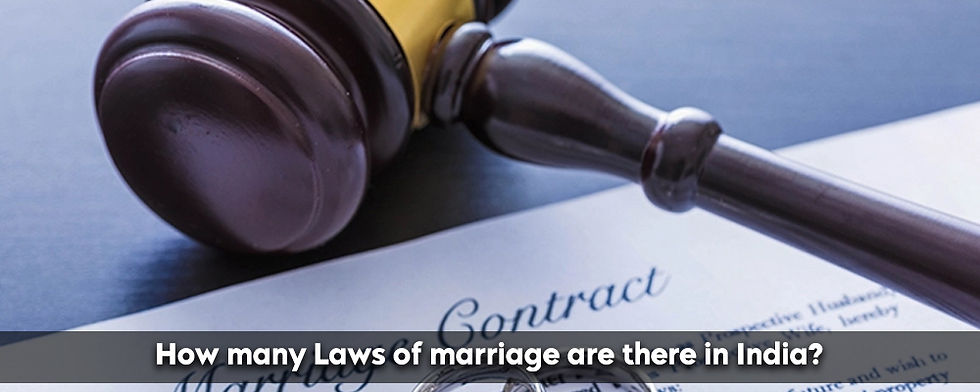How Many Laws Of Marriage Are There In India ?
- leadindia831
- Jul 14, 2023
- 3 min read
The Hindu Marriage Law, the Christian Marriage Law, the Muslim Marriage Law, and the Special Marriage Law are the four laws that govern marriage in India.
As the name suggests, different religions have different Acts or laws governing marriages among their communities. However, if two individuals belonging to two different religions wish to tie the knot, they can apply for marriage under the Special Marriage Act, 1954, and get married in court.
The procedure for Court Marriage In Faridabad has been mentioned hereunder:
Eligibility-
Persons belonging to different genders and from any caste, religion, place, etc. can marry through the Court.
There are certain conditions that have to be fulfilled for two people to register for court marriage:
There should be no pre-existing marriage; even if there was, no living spouse should be there, i.e., if the person applying for court marriage was married earlier, then at the time of marriage, he or she should be either a divorcee or a widower.
The male should have completed the age of 21 years, and the female should be more than 18 years old or older.
The parties filing for court marriage should not be in a prohibited relationship. Provided that the customs governing at least one of the parties allow it.
Documents required:
Application form duly filled and signed by the parties
Receipt of the fees for Court Marriage In Delhi or any other city, paid for the application form
Objection documents proving the date of birth of both parties.
Documentary evidence showing the stay in the area under the jurisdiction of the marriage officer;
Affidavits from both parties regarding
Date of birth
Present marital status of the parties, i.e. unmarried, divorcee or widow/er
confirmation that the parties are not within the degrees of prohibited relationships as per the Act.
Passport-size photos of both parties duly attested by a gazetted officer
Procedure for a Court Marriage
As provided under Chapter II, titled “solemnization of special marriages”, the Court Marriage Process Delhi could be understood as follows:
Notice for intended marriage
The marriage officer receives a notice in accordance with Section 5 of the Act. The notice must be given by the parties to the marriage officer in writing and in the format specified in the Second Schedule. The marriage officer mentioned shall have jurisdiction over the area where at least one of the parties has resided for a period not less than 1 month.
Publication
The marriage officer must post the notification in a discreet area of his workplace.
All true copies of the notices shall be kept in the marriage Notice Book.
If the parties are not residing in the area of the officer, he shall send copies of the notice to be published in his office.
Objection
Under Section 7 of the Act, any person can raise an objection to the notice of marriage published in the office of the registrar. The objection can be raised on the grounds mentioned in Section 7 of the Act.
Such objections must be raised within a period of 30 days of the publication of the notice.
The objection raised shall be recorded in the marriage Notice Book by the Marriage Registrar.
A marriage officer has 30 days to inquire about the legality of such objections under Section 8.
The marriage shall be solemnized if such an objection is not found to be valid.
However, if the objection raised was found valid by the Marriage officer, then the marriage won't be solemnized in court, but the matter can be taken into appeal before the District Court by the parties concerned.
Place of solemnisation
Under Section 12, marriage can be solemnized at the office of the Marriage officer or at a place within a reasonable distance.
Marriage would be valid only if both parties, in the presence of the marriage officer, said that they were ready to get married to the other party and if three witnesses were also present.
Certificate of marriage
The marriage certificate issued shall contain the names of the parties, witnesses, and the marriage officer, as well as their signatures, including the date of marriage.
For further information, it is advised that you seek legal assistance from an experienced advocate in your city. Lead India offers you a team of experienced lawyers who have been successfully assisting couples with their court marriage procedure. Hence, if you wish to talk to a lawyer about the same or seek a free legal advice, you may contact us.
SOURCE:-
Visit us: https://www.leadindia.law
Call Us: +91–8800788535
Email: care@leadindia.law
Facebook: https://www.facebook.com/leadindialaw
Twitter: https://twitter.com/leadindialaw
Pinterest: https://in.pinterest.com/lawleadindia




Comments